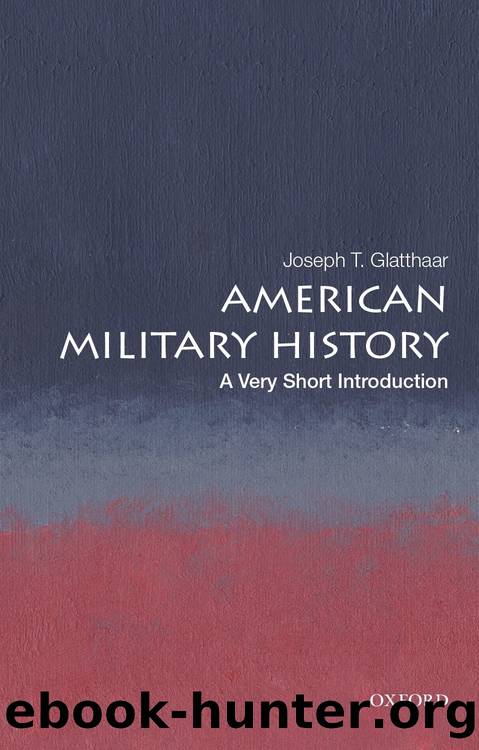American Military History by Joseph T. Glatthaar

Author:Joseph T. Glatthaar [Glatthaar, Joseph T.]
Language: eng
Format: epub
ISBN: 9780199859276
Publisher: Oxford University Press
Published: 2020-08-12T00:00:00+00:00
Mutinies, strikes, and battlefield failures compelled Germany to seek a truce on the basis of the Fourteen Points. The Allies made clear that was a nonstarter. They compelled Germany to evacuate territory to the 1870 border, grant Allies bridgeheads across the Rhine, surrender its surface and submarine fleet, and turn over vast amounts of weapons.
Wilson shocked many Americans by announcing he would personally lead in the treaty negotiations at Versailles, France. His team included no leading Republicans. Wilson soon learned that his Allied counterparts had very different objectives from his Fourteen Points. He tolerated the disagreeable terms, placing faith in a new international organization, the League of Nations, to achieve a fair and lasting peace.
Upon his return, Wilson tried to rally support for the treaty, but the public was tired of war and international affairs. Republicans objected to various components and proposed changes to the treaty. Wilson, however, would not budge. While campaigning for the treaty, Wilson suffered a massive stroke. The Senate never ratified the Treaty of Versailles. Two years later, in 1921, the United States and Germany signed a separate peace agreement to end World War I.
More than 50,000 American troops were killed in action and 200,000 were wounded. Another 57,000 at home and abroad died of disease, totaling about 1 percent of the military fatalities on both sides in the war. The war cost the United States $32 billion.
After the war, the United States demobilized rapidly. The government terminated all materiel contracts immediately, leaving manufacturers to bear the cost of reconversion.
Military units on the Western Front returned home so quickly that by June 1919 only Pershingâs headquarters and a small military contingent remained in Europe. Upon arriving home, troops received physical examinations, got paid back wages plus a small bonus, and went home with helmet, gas mask, and uniform.
The last troops to make it home were those sent to the newly established Soviet Union. When Russia collapsed and the Communists seized control of the country, Britain and France called for Allied intervention around Archangel in northwest Russia to secure supplies, aid Czechoslovakian troops who were serving on the Eastern Front, and eventually fight the Bolsheviks. Wilson sent some 5,000 Americans to join a British contingent. In the end, the Americans suffered 400 casualties for no real purpose and were withdrawn in mid-1919.
A second expedition went to Siberia on the Pacific Coast. Baker warned the American commander that he was undertaking a politically explosive campaign because of Japanese ambitions in the region. The Americans agreed to match the Japanese force of 7,000, but Japan sent 72,000. Communist successes and diplomatic pressure soured Japanâs goal of holding some territory there. The United States evacuated in 1920; Japan left two years later. As Literary Digest concluded: âSome might have liked us if we had intervened lessâ¦some might have disliked us less if we had intervened moreâ¦but having concluded to intervene no more nor less than we actually did, nobody had any use for us at all.â
Although some individuals proposed dramatic
Download
This site does not store any files on its server. We only index and link to content provided by other sites. Please contact the content providers to delete copyright contents if any and email us, we'll remove relevant links or contents immediately.
The European Opportunity by Felipe Fernández-Armesto(589)
The European History Highway: A Guide to Internet Resources by Dennis A. Trinkle Scott A. Merriman(546)
Morgan Kaufmann Digital Watermarking and Steganography by Ingemar Cox Matthew Miller Jeffrey Bloom Jessica Fridrich Ton(539)
The Seven Wonders of the Ancient World by Michael Denis Higgins(534)
Hyperculture by Byung-Chul Han(525)
European Security without the Soviet Union by Stuart Croft Phil Williams(516)
The Routledge companion to Christian ethics by D. Stephen Long Rebekah L. Miles(513)
European Security in a Global Context by Thierry Tardy(511)
Get Real with Storytime by Julie Dietzel-Glair & Marianne Crandall Follis(456)
Hudud Al-'Alam 'The Regions of the World' - a Persian Geography 372 A.H. (982 AD) by V. V. Minorsky & C. E. Bosworth(450)
Tibetan Studies in Comparative Perspective by Chih-yu Shih Yu-Wen Chen(441)
Gorbachev And His Generals by William C. Green(434)
Governance, Growth and Global Leadership by Espen Moe(430)
CliffsNotes on Fitzgerald's The Great Gatsby by Kate Maurer(419)
How Languages Are Learned 5th Edition by Patsy M Lightbown;Nina Spada; & Nina Spada(414)
The Oxford History of the World by Fernández-Armesto Felipe;(398)
The Egyptian Economy, 1952-2000 by Khalid Ikram(389)
The Oxford Handbook of the Incas by Sonia Alconini(378)
Oral Poetry and Narratives from Central Arabia: The Poetry of Ad-Dindan : A Bedouin Bard in Southern Najd (Studies in Arabic Literature, Vol 17) (English and Arabic Edition) by P. M. Kupershoek P. Marcel Kurpershoek(371)
